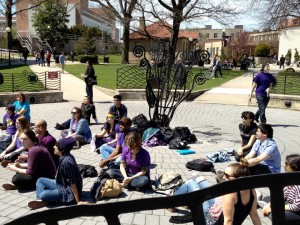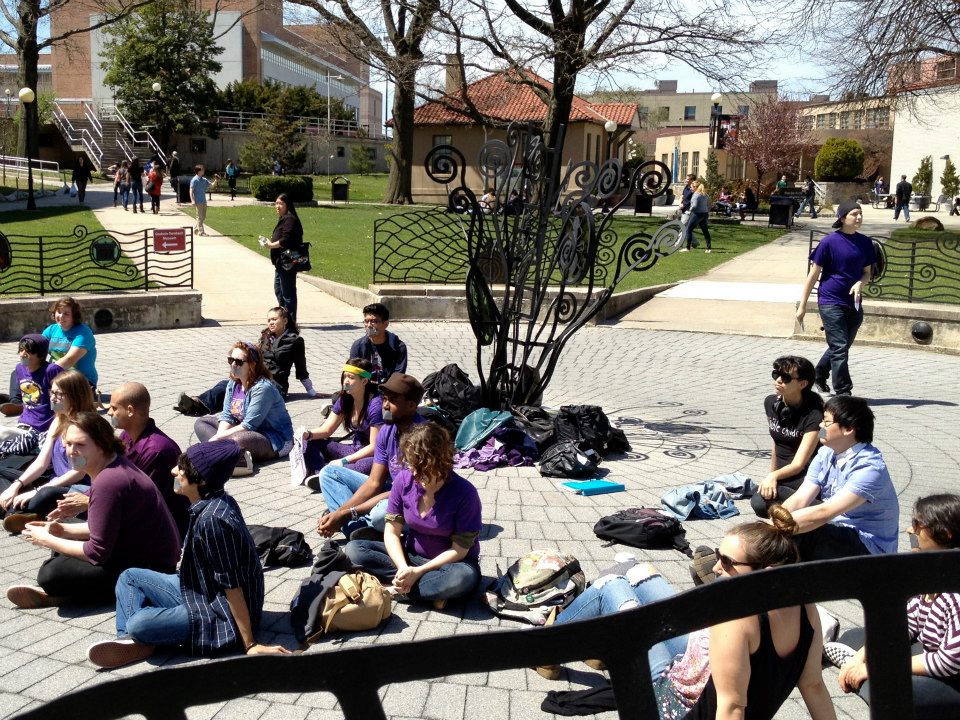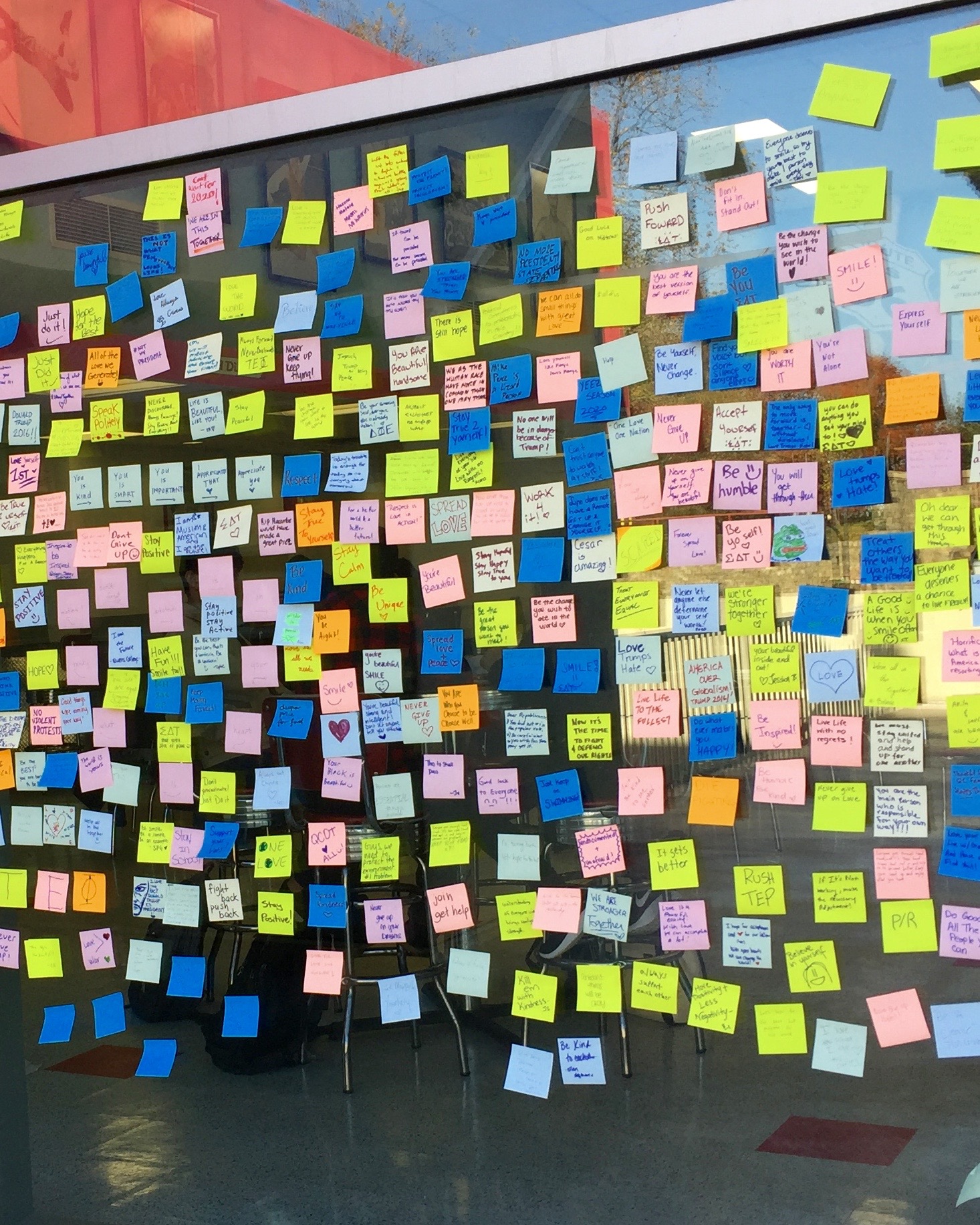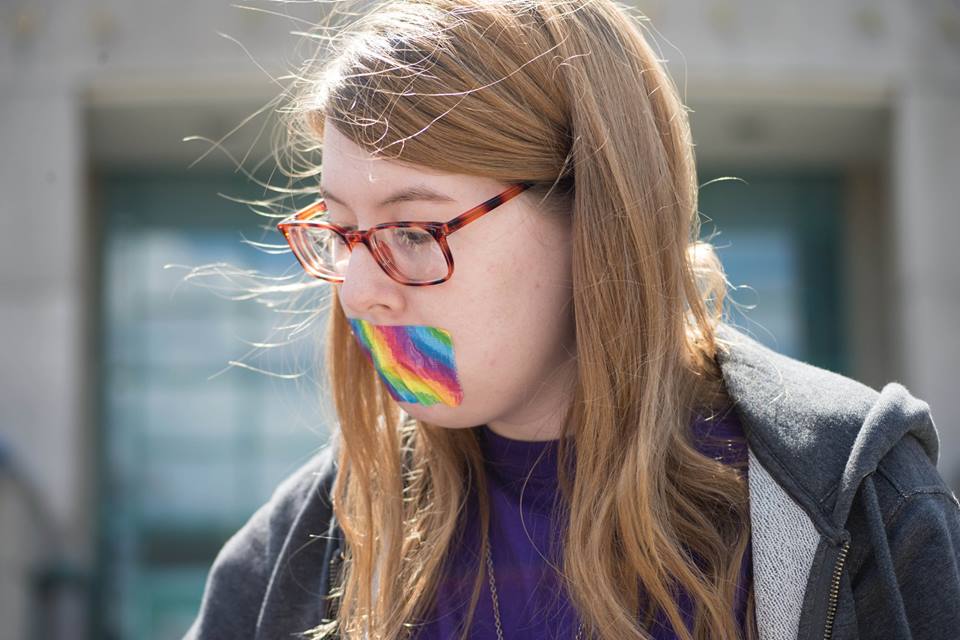
On April 17, GLASA and students participated in “Day of Silence” by wearing purple and covering their mouths with masking tape in Klapper Circle .
Oliver “Ollie” Milbourne is one of the most outgoing and friendly people at Queens College.
Walking into the Gay, Lesbian and Straight Alliance clubroom, Milbourne, 18, always has a big smile on his face and greets everyone with a warm hug.
In the room, Milbourne treats everyone like a close friend and is always willing to socialize with everyone, whether the topic is issues in the Lesbian, Gay, Bisexual, Transgender and Queer community or funny videos of animals. He is one of the most outgoing members of GLASA and his personality compliments the artwork of supportive slogans and rainbow flags that decorate the walls.
GLASA provides a safe environment for LGBTQ students and their allies to share feelings and express themselves freely in a space where they can be free of judgment or ridicule. In addition, GLASA attempts to educate the campus about issues regarding the LGBTQ community, such as with their annual safe space training sessions for professors and staff. They also hold weekly meetings where they encourage people to get to know each other better and have open discussions about issues related to LGBTQ communities.
Unfortunately, the GLASA clubroom is usually the only place on campus where Milbourne and other LGBTQ students feel they can openly be who they are. Many students feel they cannot be as open when they go to any other part of campus because of the actions or words of professors and students.
Whether or not they intentionally mean to insult or make LGBTQ students uncomfortable, these actions constrict their freedom to express who they are and their views in or out of classrooms or the GLASA clubroom. A serious issue that several LGBTQ students have is not feeling safe or comfortable in their classrooms.
Milbourne identifies as queer and never feels comfortable inside classrooms. When in the GLASA clubroom, Milbourne is usually very relaxed and talkative, but because of poor treatment in some of his classes, he does not feel as though he can speak there.
He has at times been mistaken for a girl when he is in classes. He has dealt with a couple of instances this semester where this happened explicitly.
In his social welfare class, when Milbourne raised his hand to speak during a lecture, his professor acknowledged him by saying ‘yes, young lady.’ When Milbourne corrected the professor, she gave him a look that made him feel uncomfortable.
“I’m not exactly sure what it was but it seemed reprimanding, as if I’d lied to her or as if I was wrong for speaking up. The whole class chuckled after that look and the only thing I wanted to do in that moment was run away,” Milbourne said.
Thoroughly embarrassed, he did not raise his hand or speak for the remainder of the lecture.
“My professor apologized for mistaking me as a girl but by then the damage was done, it ruined my whole day,” he said.
Another instance was during an anthropology class, where Milbourne, for the most part, found that people in the class respected the ideas and personalities of others. However, whenever he made a point in class students would say something like “Yeah, she has a good point.”
“It wasn’t all the time, but it still really bothered me,” Milbourne said. “And every time it happened I’d correct whoever it was that said the wrong pronoun, every time it happened it was exponentially more embarrassing.”
Although he corrected other students, they continued to refer to Milbourne as a woman. When the professor saw that this was continuing, he was forced to address the entire class and make a special point of stating that Milbourne was in fact a man.
“That was one of the worst days for me. I was so embarrassed I couldn’t even look anyone in the eyes,” he said.
While the intentions of the professors and students were not intentionally offensive, their actions clearly had that effect. Unfortunately, there have also been instances where students purposefully intended to hurt an LGBTQ student while in class.
Catherine Thomas, 21, is a junior and a proud member of GLASA. She moved from here from England three years ago to attend QC as an English major. During her three years at QC, she has seen and heard about several instances where professors and students have made classroom environments feel unsafe or uncomfortable for her and others.
Thomas related the story of a friend of hers, whose name she wished to keep anonymous, who suffered this kind of humiliation. During her class, they had a debate in which the topic was gay marriage. Thomas’s friend was a lesbian and she took a pro-gay marriage stance.
During the debate, it became apparent that several students on the side against gay marriage were actually against gay marriage in reality as well. Thomas’ friend became very hurt and offended and when the class found out that she was a lesbian, the situation went from bad to worse.
When she announced she was a lesbian, the students on the other side of the debate began to direct their insults at her. Several people on her team soon began to hurl insults at her and disparage gay marriage to her.
Throughout the entire argument the professor did not attempt to intervene or stop the students from harassing her. They allowed this to go on until the situation fizzled out.
“The professor said nothing and that’s not OK. My friend was very upset about that. I remember she came to me crying about it and that’s not OK,” Thomas said.
LGBTQ students who live on campus in The Summit face the added challenge of unsafe or uncomfortable situations in their home in addition to classrooms. Straight students who do not feel comfortable sharing a room with an LGBTQ student have lashed out at LGBTQ students living in student housing.
Thomas lived in The Summit for three semesters, beginning with the first semester of her freshman year. During her second semester living there, she shared a room with three other women, two of whom were lesbians and began dating each other soon after moving in. The fourth woman was very homophobic and very outspoken about it. One issue that arose was when the fourth woman verbally lashed out at the couple for kissing on the sofa in their living room.
“She would constantly say ‘don’t do that on my sofa,’ and we would have to say ‘we all paid for this sofa, it belongs to each of us, so if they want to do stuff on it it’s fine.’ I would constantly have to defend them to her along with them defending themselves,” Thomas said.
The fourth woman would constantly use phrases like “that’s so gay” or “dyke” in negative ways around her roommates and Thomas would always tell her that was not OK. The woman also brought over friends who were also against homosexuality and used homophobic slurs.
“People she brought over were not very friendly at all and she would bring them into our home and it was very uncomfortable,” she said.
Thomas lamented that the entire situation could have been avoided. Before a student moves into The Summit, there is a sheet with a list of preferences for students moving in. Thomas feels that The Summit should add an additional option asking whether someone is comfortable with having LGBTQ roommates.
Thomas knows several students who left The Summit because they had similar problems when they lived in there. While there is a grant that QC has had in the past where they offer LGBTQ students who have been kicked out of their homes one semester of free residence, it is especially important to make sure that this space is safe for all students.
“How hard is it to put on the box ‘gay friendly or not gay friendly?’ If The Summit is so gay friendly why is it letting this kind of stuff happen?” Thomas said.
The woman made a complaint to the manager about having gay roommates at the beginning of the semester but no room changes were assigned. Thomas and the other two women were asked about the situation and they said it was fine, something Thomas regrets. The situation ended when the woman left at the end of the semester because she feared for her life since she was living with lesbians.
These are just some of many untold stories of LGBTQ students on campus. GLASA encourages students to come to their room should they need support and someone to talk to about their problems and excitements. They hav taken further action to help spread awareness of LGBTQ abuse and help bring an end to these issues on campus.
On April 17, GLASA held their annual Day of Silence demonstration in Klapper Circle. Day of Silence is a national student-led event that brings attention to bullying and harassment of LGBTQ students in schools. Students from middle school to college take a vow of silence for the day, to raise awareness of this kind of harassment.
Traditionally this event involves staying silent and many schools celebrate in their own unique ways, such as holding a Breaking the Silence, rally where every so often a speaker will break the silence and tell a personal story of harassment that they have endured. GLASA opted to make their event just that in order to attract more attention to their cause.
Although the actual day takes place on April 19, GLASA chose to hold their demonstration on the 17 to coincide with Spring Fest in order to reach more people. Members of the rally wore purple articles of clothing and masking tape over their mouths to show solidarity.
Everyone walked throughout the quad handing out pamphlets explaining the nature of the demonstration. Speakers were invited to address the crowd and share stories. People shared personal stories or stories of LGBTQ youth whose stories have received wide media attention.
GLASA hopes to help prevent further harassment with the creation of their safe space training sessions. These trainings are meant to teach professors about issues in the LGBTQ community and give them ways to help make their classrooms a “safe space” for all students.
GLASA held their first safe space training in the 2012 fall semester. This first session had a turnout of 15-20 professors from various departments. GLASA president Sam Nathanson was happy with the turnout but hoped to improve in the future.
“Big success but we want more, and 15 to 20 professors is not enough for us, we’re going to get the whole school,” Nathanson, 21, said. “We are gonna make sure that every single classroom is a safe space.”
In order to increase attendance for future safe space trainings, GLASA plans to train each department individually. Nathanson hopes that this new approach will be successful in reaching more professors.
“We want to have the departments propose the date and we’ll show up, make it really easy and accessible for departments and everybody wins. They get their departments a little safer, we get a safe space on campus,” Nathanson said.
Given the large number of departments, it would not be possible for only a handful of GLASA members to lead each individual training session. GLASA has begun recruiting its members and hope to have 10 to 15 additional students to conduct the trainings.
Nathanson and members of GLASA who led the first training will teach these students the material they covered. The goal is that by having more students to lead sessions, the burden will not fall on a handful of students.
“At any given time if a department says they want training on Friday at 3:15, we can say ‘OK, who’s available out of our 15 people?’ So, we don’t overload a group of four people with 30 trainings for the semester, we’ll have some people do five trainings over the semester,” Nathanson said.
The trainings will include students sharing personal stories of instances where they were bullied or felt uncomfortable on campus. Also, a list of LGBTQ terminology will be defined and discussed.
There will also be a discussion on how professors can make their curricula more inclusive. GLASA hopes to remove the heteronormative lens that is present in many classes, meaning that the courses view topics with the idea that heterosexuality is the assumed norm.
“It’s really important to not only talk about heteronormative issues but also talk about LGBTQ issues, especially in sociology and psychology classes. To not leave out other types of families where there aren’t a mom and dad, it’s very important to discuss other families as well,” Nathanson said.
One issue that will be discussed is ways to make classroom introductions on the first day of classes. For example, students who are transgender may not identify with the name that is listed on the attendance sheet.
“Sometimes the name on the roster is not the name that they prefer to be used, and sometimes preferred gender pronouns — PGPs — can get confused; he, she etc.,” Nathanson said. “It’s just a big problem and it’s a lot of embarrassment that we want to avoid so we teach ways to properly introduce new students to the classroom.”
PGP refers to how a person chooses to classify him or herself. This is something that Nathanson has dealt with in the past being a trans-man. Nathanson’s first name on the attendance sheets for his classes list his legal name which he has tried to distance himself from. His PGP is “he” and prefers to be called Sam or Samuel. He is extremely uncomfortable when his professors address him by his legal name.
“It’s just a lot of embarrassment we can avoid for everybody involved. The teachers stumble over words and don’t know what to say and the whole class just sort of stares at you and it’s just not a good first day of the semester, to say the least,” Nathanson said.
He recommends that students email professors in advance to explain about what your PGP is and the name you would prefer your professor to use. He also believes that instead of calling out names, professors should pass around a sign-in sheet so students can sign in their PGP’s and any name they may prefer to be called.
While the intended goal of these trainings is to make classrooms on campus safer, there are also other needs that need to be met for the LGBTQ students. There are those who feel that there are not adequate resources for LGBTQ students and Jennifer Polish, a recent graduate of QC, has been trying to change that.
Polish commends all of the hard work that GLASA has done to improve life on campus for LGBTQ students, but feels that the burden should not rest solely on them. Polish believes that an LGBTQ resource center at QC would be a great asset for the college in terms of providing services for LGBTQ students and staff.
One service would be helping students who are kicked out of their homes because they are LGBTQ. Two years ago, Polish was friends with five to six students who were all forced to leave their homes within a few months of each other. They were put up in The Summit by a grant from QC, and it was up to fellow students to provide most or all other forms of support.
“We help each other — that’s fine — but it [is] really emotionally draining. That shouldn’t be the responsibility of students…there should be an infrastructure for that,” Polish said.
Polish credited the existence of the grant to the fact that some administrators are openly gay. Without a sustainable infrastructure that is independent of individual administrators, she fears it may have been available for LGBTQ students.
Polish feels that the resources needed for queer students should not be dependent on the personal empathies and sympathies of administrators.
“It shouldn’t be dependent on [administrators], it shouldn’t be dependent on individuals; it has to be dependent on an institutional structure like a resource center that’s self-sustaining and will keep going regardless of who’s in charge where,” she said.
Counseling specific to LGBTQ students is something else that the center could offer.
“You can have all the sensitivity trainings but there’s a difference between being trained to be sensitive and being knowledgeable about a community because you’re a part of that community. And that makes a huge difference, especially to young people that are seeking services,” Polish said.
Other services the center could provide include information on the LGBTQ community in NYC and where to go to meet people. Setting up internships with queer organizations is also something that can be set up, as well as establishing more gender-neutral restrooms for students who need them.
She hopes that GLASA will continue to be a strong presence in helping LGBTQ students on campus if and when a resource center is opened.
“[Students] should not stop being active, they should not stop fighting for what they need, but it shouldn’t be all their burden,” Polish said.
Polish hopes to get the resource center opened as soon as possible. With the help of GLASA, she wants to make QC a place that is safe for and inclusive to everyone.
In order to truly live up to the meaning of being inclusive, GLASA, decided to change their club name to something that would be inclusive to everyone because it was felt that the current name excluded people who identify as transgender or questioning.
Through a vote, GLASA will from now on be known as, PRISM: The Sexuality and Gender Alliance. It’s a name that is meant to be inclusive to everyone on the spectrum now and in the future.














